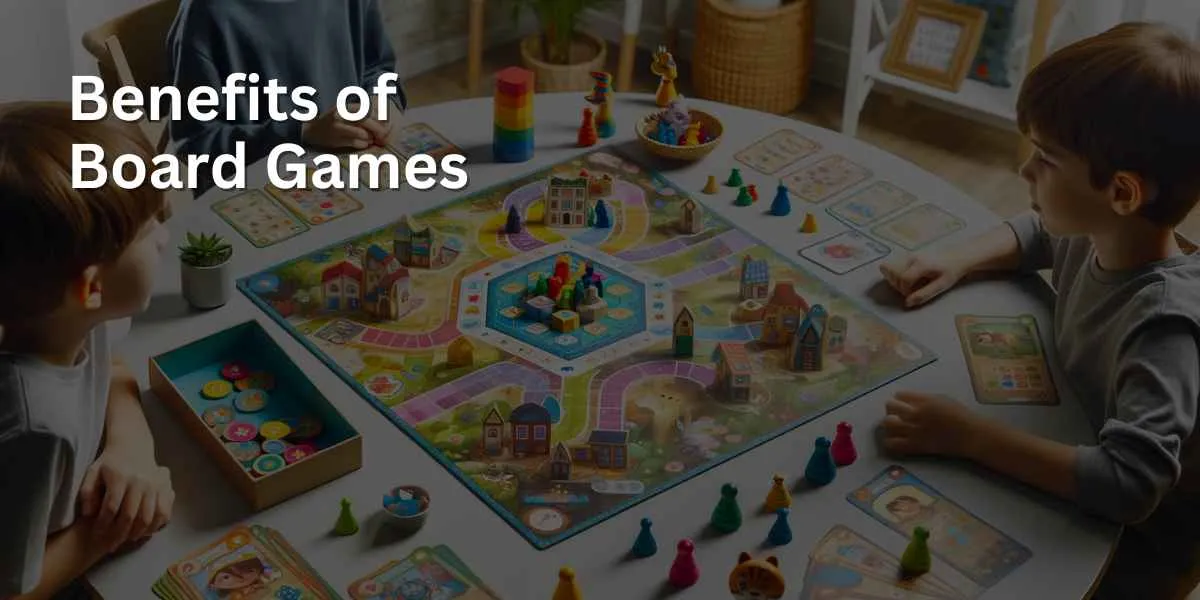Exploring the avenue of board games and keen on understanding their benefits for children? You’re rolling the dice in the right direction. Board games are not merely sources of entertainment; they are powerful educational tools that offer a treasure trove of learning and development opportunities.
The allure of board games extends beyond the playful competition; they harbor lessons and skills that are pivotal for a child’s growth.
Drawing from my expertise in child development and toys, I’ve mapped out a comprehensive guide that delves into the multifaceted benefits of board games for children.
Let’s navigate this playful landscape together, discovering how board games foster critical thinking, social interaction, patience, and a multitude of other essential life skills, making them a worthy addition to your child’s learning journey.
Engaging in board games can significantly contribute to a child’s development. They foster social skills through interaction and turn-taking, promote critical thinking as players strategize to win, and enhance problem-solving abilities. Board games also provide a fun way to improve focus and patience, crucial for academic success. Moreover, games with numerical or word-based challenges can bolster mathematical and language skills, making board games a multifaceted tool for holistic child development.
Key Takeaways on How Board Games for Kids
- Board games provide an interactive and fun way to help kids develop important skills, such as cognitive development, social skills, and hand eye coordination, fine motor skills and problem solving.
- Choosing the right game for your child is an important part of fostering their development. With careful consideration, you can ensure that the game you choose will be both enjoyable and beneficial for them.
- By setting clear rules and expectations, encouraging positive interaction between players, and making it an enjoyable experience for all involved, you can ensure that playing games with kids is a fun activity.
Benefits of Board Games in Child Development?
Board games are a great way for adults to help children develop cognitively, socially, and problem-solving skills. Here are some of the benefits of board games for your child’s attention span and development:
| Benefit Category | Description |
|---|---|
| Cognitive Development | – Problem-Solving: Board games often challenge children to think strategically and solve problems to achieve the game’s objective. – Critical Thinking: Encourages the development of critical thinking skills as children plan their moves and anticipate opponents’ actions. – Memory Enhancement: Some games require memorization of cards or positions which can improve memory. |
| Math Skills | – Number and Shape Recognition: Basic recognition of numbers and shapes is often a part of board games. – Counting: Games often require counting spaces, which helps reinforce basic math skills. – Pattern Recognition: Identifying patterns and sequences can be a part of gameplay. |
| Language Skills | – Vocabulary: Many board games introduce new vocabulary and encourage verbal communication. – Reading Comprehension: Reading instructions or card text can enhance reading comprehension. |
| Social Skills | – Turn-Taking: Teaches the importance of waiting your turn and being patient. – Sportsmanship: Learning to win gracefully and lose with dignity is a crucial social skill. – Teamwork: Cooperative games promote teamwork and collaboration. |
| Emotional Development | – Emotional Resilience: Helps in developing emotional resilience as children navigate winning and losing. – Concentration: Enhances the ability to focus and maintain attention on a task. |
| Fine Motor Skills | – Coordination: Manipulating pieces on a board helps in developing fine motor skills and hand-eye coordination. |
| Creativity and Imagination | – Creative Thinking: Some board games encourage creative thinking and imaginative play. |
| Family and Social Interaction | – Family Bonding: Provides an opportunity for family interaction and bonding in a fun setting. – Social Interaction: Encourages interaction with peers, promoting socialization and friendship. |
Cognitive Development
Playing with toys is an essential part of a child’s development. Board games, for example, can help improve a child’s memory, concentration, and logical thinking. By playing different types of board games with your kids, you can help them learn how to think strategically and plan ahead.
It’s worth considering how do toys affect child development, as age-appropriate toys can have a positive impact on a child’s cognitive, social, and emotional skills.
Games like chess or checkers require players to remember certain moves or patterns in order to win. This helps strengthen their ability to recall information quickly and accurately.
Additionally, these types of board games also encourage their critical thinking skills as they need to consider various strategies before making decisions on their next move.
Emotional and Social Skills
Playing board games for families is an excellent way for children to spend quality time with family and to practice important social skills such as communication, cooperation, negotiation and compromise.
When playing together with other people it encourages children to take turns speaking up while learning how listen carefully when others have something important say too.
It also teaches them the importance of how to lose graciously and how to follow instructions which is essential in any type of relationship whether it be a family unit at home or school or even later on in life when interacting with colleagues at work etc.
To further enhance a child’s social development, it’s important to consider toys that promote communication and cooperative play, in addition to exploring the benefits of board games.
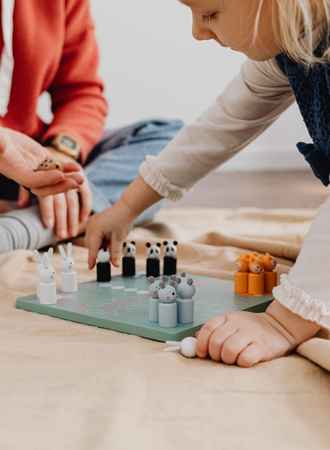
Problem Solving & Basic Arithmetic
Board game play gives kids the opportunity to solve problems both individually and collaboratively, using logic reasoning, number sense and creative thinking skills that will be beneficial throughout their lives no matter what field they choose to pursue professionally down the line.
They must figure out ways around obstacles presented by other players while still trying to achieve desired outcomes within the parameters set forth by the game itself.
These experiences provide young players with valuable lessons that cannot be learned from books alone, but only through actual hands-on experience in everyday life.
Types of Board Games for Kids
Board games bring people together and they can help kids develop. They can help develop cognitive, spatial awareness, social, and analytical thinking skills while providing hours of fun for the whole family.
There are many different types of board games available for kids, each with its own unique benefits.
Strategy Games
Some games require players to use their brain and think strategically in order to win. These games often involve planning several steps ahead and using logic or deduction to outwit opponents.
Examples of brilliant games include chess, checkers, Go Fish!, Stratego, Risk, Clue, Battleship and more. Playing these types of board and card games together can help children learn how to think critically and plan ahead while having fun at the same time!
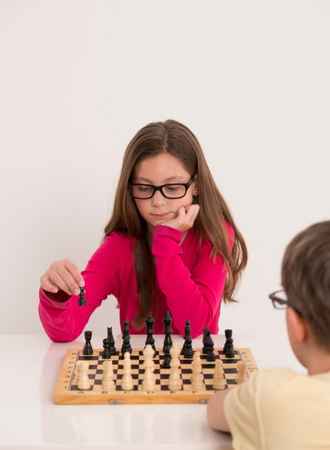
Cooperative Games
Many games require players to work together as a team in order to achieve a common goal or solve a puzzle.
These types of board games encourage cooperation among players rather than competition which is beneficial for developing social skills such as, communication skills and collaboration.
Examples include Pandemic Legacy Season 1 & 2 , Forbidden Island , The Fox In The Forest, Hanabi and Mysterium.
Educational Games
Educational board games provide an entertaining way for children to learn new concepts or practice existing ones such as math facts or spelling words.
Many educational game companies create age-appropriate versions that focus on specific topics like science or history so they’re perfect for reinforcing what your own child learns or is already learning in school.
Popular examples include Scrabble Junior , Math Dice Jr., Sushi Go Party!, Blokus Junior .
No matter what type of game you choose, it is important that it is age appropriate and tailored towards your child’s interests language skills and abilities so they can get the most out of their experience playing it.
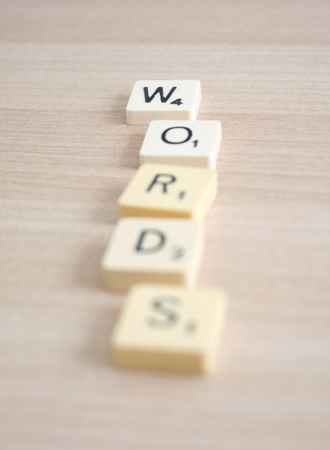
How to Choose the Right Board Games for Your Child
Choosing the right board games for your child can be a daunting task. With so many options available, it’s important to consider age appropriateness, interests and abilities, and quality and durability when selecting the perfect game.
Age Appropriateness
When choosing a board games for your child, make sure it is age appropriate. Look at the recommended ages on the box or read reviews from other parents to get an idea of how challenging or complex the game might be for older children. For younger children, look for games that are simple enough to understand but still engaging enough to keep their attention.
Interests and Abilities
Consider what type of activities your child enjoys doing most often – do they like puzzles? Do they prefer cooperative play over competitive play? Take into account their interests as well as their skill level when selecting a board game that will keep them engaged without being too difficult or frustrating.
Quality and Durability
Make sure you select a high-quality board game that will last through multiple plays without breaking down easily. Check out customer reviews online before making your purchase to ensure you’re getting some fun time with something durable that won’t need replacing soon after buying it!
When shopping for a new board game for your family, consider the following factors to find one that everyone can enjoy playing together: age range of players, complexity of rules and gameplay, length of playtime, theme or genre playing games (strategy games, trivia games etc.), and any special features.
Tips for Playing Board Games With Kids
Playing board games with older kids together can be a great way to bond and have fun while also helping them learn important skills.
To make the experience enjoyable for everyone, it’s important to create a safe environment and set clear rules and expectations before starting the game. Explain what is expected of each player in terms of behavior, turn taking, and following directions. This will help keep things running smoothly during gameplay.
Encouraging positive interaction is another key component when playing board games with kids. Remind your children that it’s okay to lose or make mistakes – this teaches them resilience and how to handle disappointment in a healthy way.
Encourage kids to praise their efforts rather than focusing on winning or losing as this helps foster good sportsmanship.
Finally, making the game fun is essential! Try adding silly challenges like singing songs or doing an animal sound whenever someone lands on a certain space – this will add some extra excitement into the mix!
You and friends can also use props such as stuffed animals or other toys to bring life into the game and keep everyone engaged throughout playtime.
Creative Ways to Play Board Games With Kids
But it doesn’t have to be the same game every time! There are plenty of creative ways to teach kids play board games that will keep everyone entertained.
Create variations on the rules
To make things more interesting, try creating variations on the rules of your family time favorite board game. For example, you could add in an extra challenge or rule for younger players who might need help understanding how to play. You could also create new rules that give different rewards or punishments depending on what happens during gameplay.
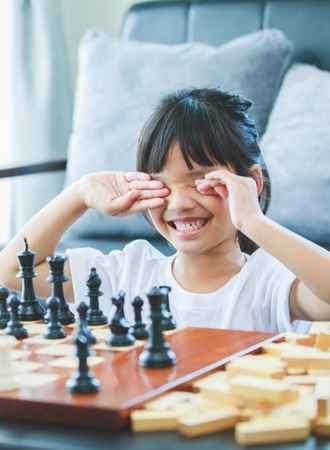
Use props or toys to enhance gameplay
Adding props or toys into your board game can make it even more exciting! If you’re playing a strategy game like chess, use small figurines instead of pieces for added visual appeal and excitement.
Or if you’re playing something like Monopoly, add in some plastic money so everyone has their own “bank” when they land on certain spaces.
Incorporate other activities into the game
Board games don’t always have to involve just sitting around a table – why not incorporate other activities into your game?
For example, if you’re playing something like Snakes & Ladders, why not turn the game pieces of it into an obstacle course by having each player move from one square to another while performing tasks such as hopping on one foot or crawling through tunnels?
This is sure to get everyone laughing and having fun!

